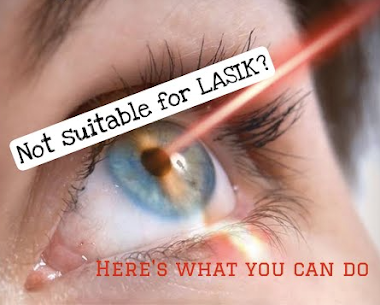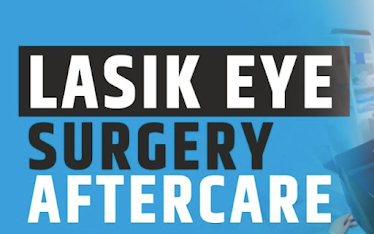Do I need Glasses after Lasik?
Introduction:
If you just had LASIK surgery, you might wonder whether you still require glasses to see clearly. Many vision issues can be resolved with LASIK, a common and efficient technique, but it's crucial to know what to anticipate following the operation.
This in-depth manual will answer "Do I still need glasses?" and cover the post-LASIK experience. Whether you're considering getting LASIK or have previously undergone the procedure, this guide will provide important information to help you.
Understanding how Lasik surgery affects eyesight:
Many different vision issues can be successfully treated using lasix surgery, a common operation for vision correction. For those thinking about or who have undergone Lasik surgery, it is essential to comprehend the impact on eyesight. We shall examine the alterations to eyesight following Lasik surgery in this part.
1. Better eyesight: Improving eyesight is one of the main objectives of Lasik surgery. Many people notice a noticeable improvement in their vision immediately following the treatment. Astigmatism, nearsightedness, and other refractive problems are all corrected during surgery, enabling patients to see properly without needing glasses or contact lenses.
2. Quick Recovery: Most people report quick visual recovery after LASIK. The eyes may initially feel dry or gritty and may be sensitive to light, but these symptoms often disappear within a few days or weeks. It's crucial to adhere to the surgeon's postoperative advice.
3. Lessened Requirement for Glasses: While some may still require glasses for certain tasks like reading or night driving, many people discover that their reliance on them has greatly decreased due to Lasik surgery. For most patients, the surgery frequently succeeds in restoring good vision without needing corrective eyeglasses.
4. Visual Acuity: After Lasik surgery, eyesight usually becomes better. Many patients report improved visual acuity, meaning they can see more clearly and sharply than before the operation. People may now enjoy hobbies like reading, watching television, or playing sports without being hindered by hazy or distorted vision due to visual acuity advancements.
5. Stability of Results: Lasik surgery often has long-lasting impacts on vision. The surgery usually results in permanent vision correction once the eyes fully recover. Presbyopia, or trouble focusing on close objects, is one age-related eye alteration that may continue developing and necessitate reading glasses.
6. Potential Side Effects: Although Lasik surgery is considered safe and successful, it's important to be informed of potential issues or side effects. Dry eyes, glare, halos, or starbursts surrounding lights are a few of them, along with abnormalities in night vision and under- or overcorrection of vision. It's crucial to mention these adverse effects with a skilled surgeon during a consultation, even though they normally pass quickly.
After LASIK, some factors might affect whether you require glasses:
While Lasik surgery aims to achieve clear vision without needing glasses or contact lenses, several variables affect whether someone still needs glasses following the treatment. It's critical to comprehend these elements. The following variables may affect whether you require glasses after a LASIK:
1. Refractive defects: Lasik surgery successfully treats common refractive defects such as nearsightedness, farsightedness, and astigmatism. Higher refractive errors, however, may still necessitate glasses for some activities, particularly if total correction is not achievable. Going through the anticipated correction level with the physician at the preoperative consultation is crucial.
2. Age-Related Changes: Although laser eye surgery (LASIK) can correct refractive defects, it cannot stop the eyes' natural aging. Presbyopia, or the progressive loss of the capacity to concentrate on close objects, can occur as people age. After age 40, it frequently develops and may call for using reading glasses or multifocal contact lenses. Presbyopia is not fixed by lasik surgery; thus, people may still require glasses for up-close work.
3. Corneal Healing and Stability: The cornea's capacity to recover is essential to the success of Lasik surgery. The cornea may need many weeks or months to stabilize before eyesight is at its clearest. Some people may notice eye-light changes during this healing phase, necessitating the temporary use of glasses until the eyes have entirely stabilized.
4. Individual recovery reaction: Each person's recovery reaction might be unique following Lasik surgery. While most people get the desired amount of vision correction, some may still have a little refractive error or tiny corneal abnormalities that impair vision. In these situations, glasses may be prescribed to improve eyesight or, if extra correction is required, to give it.
5. Factors related to your job or lifestyle: Some jobs or choices may call for more precise eyesight or particular visual needs. People who work in occupations that require attention to detail, like architects or surgeons, may find wearing glasses to improve visual acuity beneficial. Similarly, despite Lasik surgery's success, those who engage in high-performance sports or activities could decide to use protective glasses or specialized eyewear.
Discussing these issues with a trained ophthalmologist during the preoperative appointment is crucial. They can evaluate unique situations, perform required tests, and offer tailored suggestions based on particular vision demands and objectives. Although many people who get Lasik surgery have exceptional vision without needing glasses, it's vital to keep reasonable expectations in check and be ready if glasses are still required for some activities or circumstances.
Choosing whether to wear glasses after LASIK:
Choosing to wear glasses after Lasik surgery ultimately rests with the patient and their particular requirements. Even though Lasik surgery can considerably reduce or even completely remove the need for glasses, there are still some situations when they may be necessary.
It's crucial to go into Lasik surgery with reasonable expectations. Although the surgery can significantly enhance eyesight, it may only sometimes result in perfect vision with the need for glasses. Individual eye health, prescription strength, and age can all affect how well surgery goes.
It is essential to adhere to your eye care professional's instructions and guidance during recovery time. They can evaluate your eyesight and offer the best advice on using glasses.
For particular tasks or circumstances, such as reading small print or driving at night, glasses may occasionally be required. Your eye doctor could advise particular lens alternatives or prescribe reading glasses to meet these demands.
It's crucial to remember that every person has different eyesight requirements. After Lasik surgery, some people could discover they no longer need glasses, while others might find that they do in some circumstances. Ultimately, the choice should be made in cooperation with your eye care specialist, who may offer tailored advice based on your situation.




Comments
Post a Comment